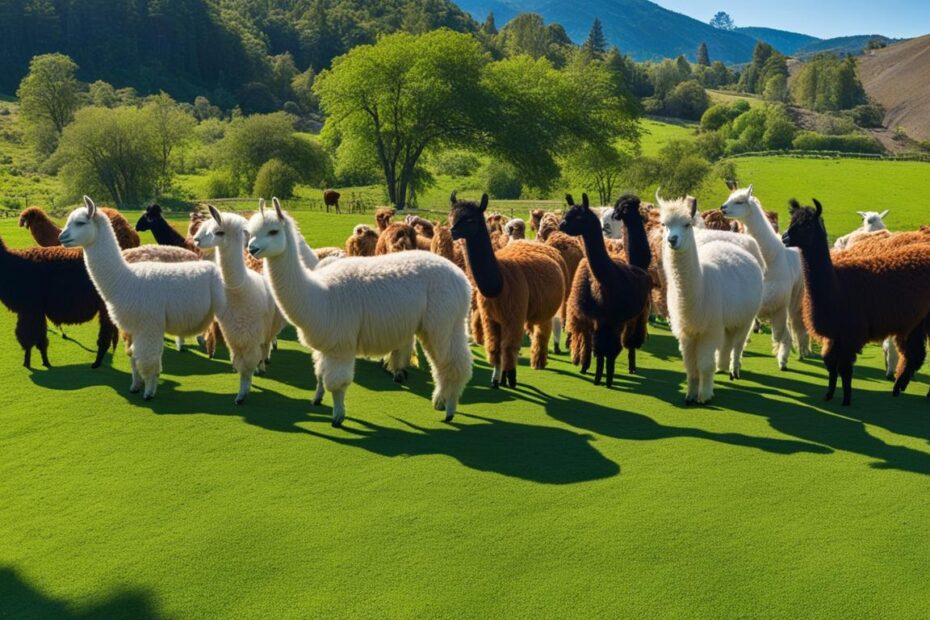Are you considering raising alpacas and goats together on your farm? Wondering if these two species can coexist harmoniously? In this article, we will delve into the compatibility of alpacas and goats, discussing the factors to consider when keeping them together.
It’s essential to meet the needs of both alpacas and goats for their successful cohabitation. From food and housing to health care, providing the right environment is crucial for their well-being.
Key Takeaways:
- Alpacas and goats can live together as long as their needs are met.
- Proper food, housing, and health care are essential for their well-being.
- There are benefits and challenges to keeping alpacas and goats together.
- Introducing alpacas to goats should be done gradually and with caution.
- Alpacas can provide protection for goats against small predators.
Guide for Keeping Goats and Alpacas Together
When it comes to keeping goats and alpacas together, there are several important considerations to keep in mind. By following these tips, you can ensure a harmonious cohabitation between these two species in the same habitat.
1. Providing Proper Food: Both goats and alpacas have specific dietary requirements that need to be met for their optimal health. It is essential to provide them with suitable food options, including high-quality hay and nutritional supplements, to fulfill their nutritional needs.
2. Offering Suitable Housing: Goats and alpacas need adequate shelter to protect them from harsh weather conditions. Ensure that their housing structures are spacious, well-ventilated, and secure to provide them with a comfortable living environment.
3. Allowing Sufficient Pastured Space: Goats and alpacas require ample pasture land for grazing and exercise. Provide them with enough space to roam freely, ensuring that the grazing areas are well-maintained and offer a variety of vegetation for their browsing preferences.
4. Implementing Good Health Care Practices: Regular health checks, vaccinations, and deworming are crucial for both goats and alpacas. Consult with a veterinarian to develop a comprehensive health care plan that includes preventative measures against diseases and parasites that may affect both species.
By following these tips, you can create a favorable environment for keeping goats and alpacas together. However, it’s important to monitor their interactions and behavior closely, as aggression and bullying can sometimes occur. With proper attention to their individual needs and careful management, goats and alpacas can thrive in each other’s company.
Pros of Keeping Goats and Alpacas Together
Keeping goats and alpacas together on the same farm can offer several benefits for farmers. Let’s explore the advantages of housing these two animals together:
Table: Benefits of Keeping Goats and Alpacas Together
| Benefit | Description |
|---|---|
| Space-saving | By cohabitating goats and alpacas, farmers can optimize their farm space, as these animals can share the same pasture and housing areas. This allows for more efficient use of land and resources. |
| Reduced fencing | When goats and alpacas are kept together, the need for separate fencing can be minimized. Alpacas are known for their ability to deter predators, which can provide added security to the goats. |
| Predator protection | Alpacas have a natural instinct to protect their herd, making them excellent guardians for goats. Their alertness and size can ward off small predators such as foxes and coyotes. |
| Pasture management | Goats and alpacas have different grazing preferences, which can help maintain healthy pasture land. While goats are known for their ability to browse on plants and shrubs, alpacas prefer to graze closer to the ground, resulting in a more balanced vegetation control. |
“By keeping goats and alpacas together, farmers can optimize their farm space and save on fencing materials, while also benefiting from the predator protection provided by alpacas and the complementary grazing habits of both animals.”
While the cohabitation of goats and alpacas offers numerous advantages, it is important to consider the potential challenges and drawbacks. Farmers should be aware of the following cons when deciding to house these animals together:
- Bullying behavior: Goats and alpacas may exhibit bullying behavior towards each other, leading to potential injuries. Close monitoring and appropriate management strategies are necessary to prevent conflicts.
- Environmental cleanliness: The presence of multiple animals in one habitat can result in a dirtier environment, requiring regular cleaning and maintenance to ensure the well-being of both species.
- Health considerations: There is a risk of diseases being transmitted between goats and alpacas. Maintaining strict health care practices, such as regular vaccinations and deworming for both animals, is crucial to minimize the spread of diseases.
By weighing the pros and cons, farmers can make an informed decision about keeping goats and alpacas together. With proper management and care, the benefits of cohabitation can outweigh the challenges and create a harmonious environment for both animals on the farm.
Cons of Keeping Goats and Alpacas Together
While there are many benefits to keeping goats and alpacas together, there are also some considerations to keep in mind. It’s important to be aware of the potential challenges that may arise when housing these two species together in the same habitat.
1. Bullying Behavior and Injuries
One of the cons of keeping goats and alpacas together is the possibility of bullying behavior. Goats can sometimes exhibit aggressive behavior towards alpacas, especially during feeding time or when establishing dominance. This can lead to injuries, such as bites or headbutts. It’s crucial to closely monitor their interactions and intervene if necessary to prevent harm to either animal.
2. Maintaining a Clean Environment
Having multiple animals in one area can result in a dirtier environment. Both goats and alpacas produce manure, and if not properly managed, it can lead to unsanitary conditions. Regular cleaning and proper manure disposal are essential to prevent the spread of diseases and maintain a healthy living space for both species.
3. Disease Transmission
Another consideration when keeping goats and alpacas together is the risk of disease transmission. These two species have different health requirements and may be susceptible to different illnesses. It’s important to implement good health care practices, such as regular vaccinations, deworming, and quarantine procedures for new animals. Consultation with a veterinarian is crucial to ensure the well-being and health of both goats and alpacas.
In conclusion, while there are cons to housing goats and alpacas together, these challenges can be managed with careful monitoring, proper cleaning, and diligent health care practices. By considering the unique needs of both species and implementing appropriate measures, it is possible to create a harmonious environment for goats and alpacas to coexist.
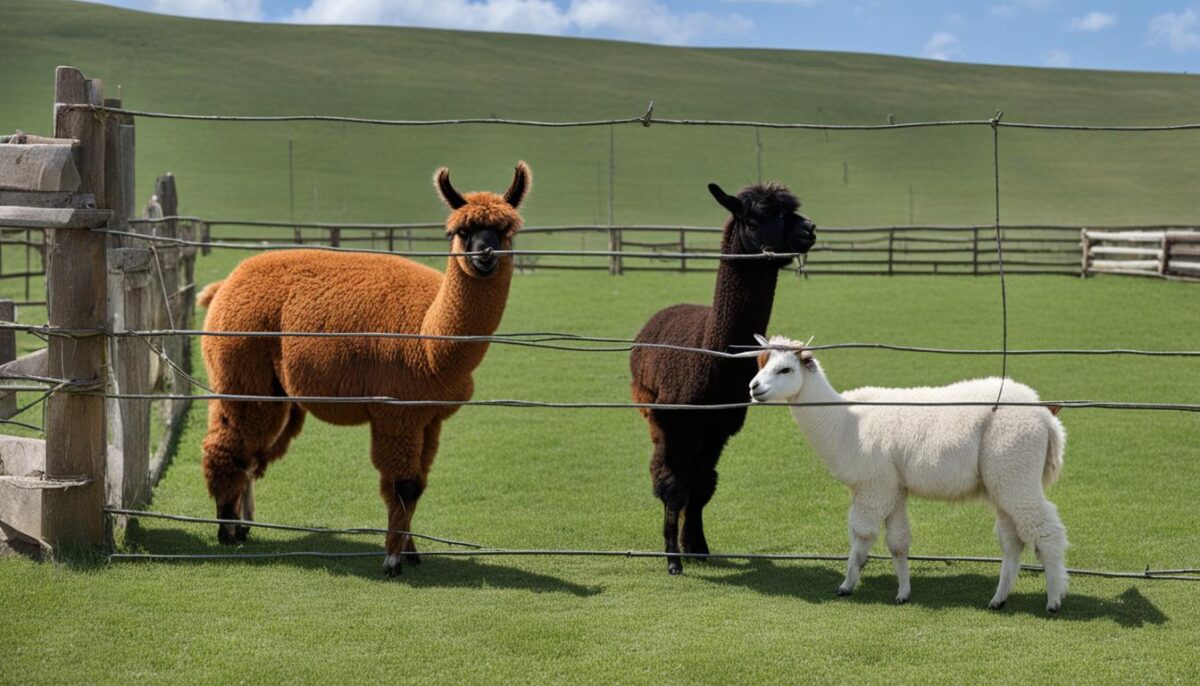
How to Introduce Alpacas to the Goats
Introducing alpacas to goats can be a delicate process that requires patience and careful observation. By following the right steps, you can ensure a successful integration and create a harmonious environment for both alpacas and goats.
Gradual Introductions
Begin by introducing the alpacas to the goats in a controlled and supervised manner. Use a leash or animal halter to have control over the alpacas’ movements. Bring them near the goats while keeping a safe distance. Observe their reactions and behaviors, ensuring that they remain calm and comfortable.
If any signs of aggression or hostility are displayed, separate the animals and try again later. Gradually increase the amount of time they spend together, always monitoring their interactions closely. This gradual approach allows them to become familiar with each other’s presence and establish a sense of acceptance.
Separate Feeding Areas
To prevent any competition or conflicts during feeding time, it’s important to provide separate feeding areas for the alpacas and goats. This ensures that each animal has access to their own food without feeling threatened or challenged by the other.
Provide Adequate Space
Make sure to provide enough space for the alpacas and goats to roam and explore. This helps prevent overcrowding and reduces the chances of territorial disputes. Ample space also allows them to exercise and graze comfortably without feeling cramped or confined.
Remember, patience and consistency are key when introducing alpacas to goats. With time, they can learn to coexist peacefully, creating a harmonious environment on your farm.
Final Thoughts
After exploring the considerations for keeping alpacas and goats in the same habitat, it is clear that successful integration is possible with proper care and attention. The key to a harmonious cohabitation lies in providing both animals with their specific needs and ensuring their well-being.
When introducing alpacas to goats, it is important to proceed gradually and monitor their interactions. By allowing them to become comfortable with each other over time, they can eventually live together without the need for restraints, fostering a sense of companionship within the herd.
While there are challenges to keeping alpacas and goats together, such as potential bullying behavior and the risk of disease transmission, the benefits of saving space on the farm and creating a harmonious environment can outweigh these drawbacks. By prioritizing proper food, housing, and health care practices, farmers can create a thriving environment for both animals.
Considerations for Successful Integration:
- Gradual introductions
- Monitoring interactions
- Providing suitable food and housing
- Implementing proper health care practices
Overall, with careful management and consideration, alpacas and goats can live together successfully, benefiting from each other’s presence and creating a balanced and vibrant farm environment.
Are Alpacas Good with Goats?
In the realm of farm compatibility, alpacas and goats have formed a harmonious alliance. Alpacas, known for their protective nature, can serve as steadfast companions and guardians for goats. They provide an added layer of security, particularly against small predators, ensuring the safety of the entire herd.
Alpacas and goats also share similar dietary preferences, making it easier to manage their feeding routine. Both animals thrive on a diet consisting of hay and nutritional supplements. This commonality in dietary needs streamlines the feeding process and allows for efficient resource allocation on the farm.
Alpacas contribute to the well-being of goats by offering vigilant protection and establishing a sense of security within the herd.
Moreover, the presence of alpacas in a mixed-species grazing system can be highly beneficial. While goats are voracious grazers, alpacas have a more selective grazing habit. This contrast in grazing preferences helps maintain the pasture land by preventing overgrazing and ensuring a healthy balance of vegetation.
Overall, the symbiotic relationship between alpacas and goats proves to be advantageous on multiple fronts. With alpacas’ protective instincts, dietary compatibility, and complementary grazing habits, these two species can coexist harmoniously, fostering a safe and thriving environment on the farm.
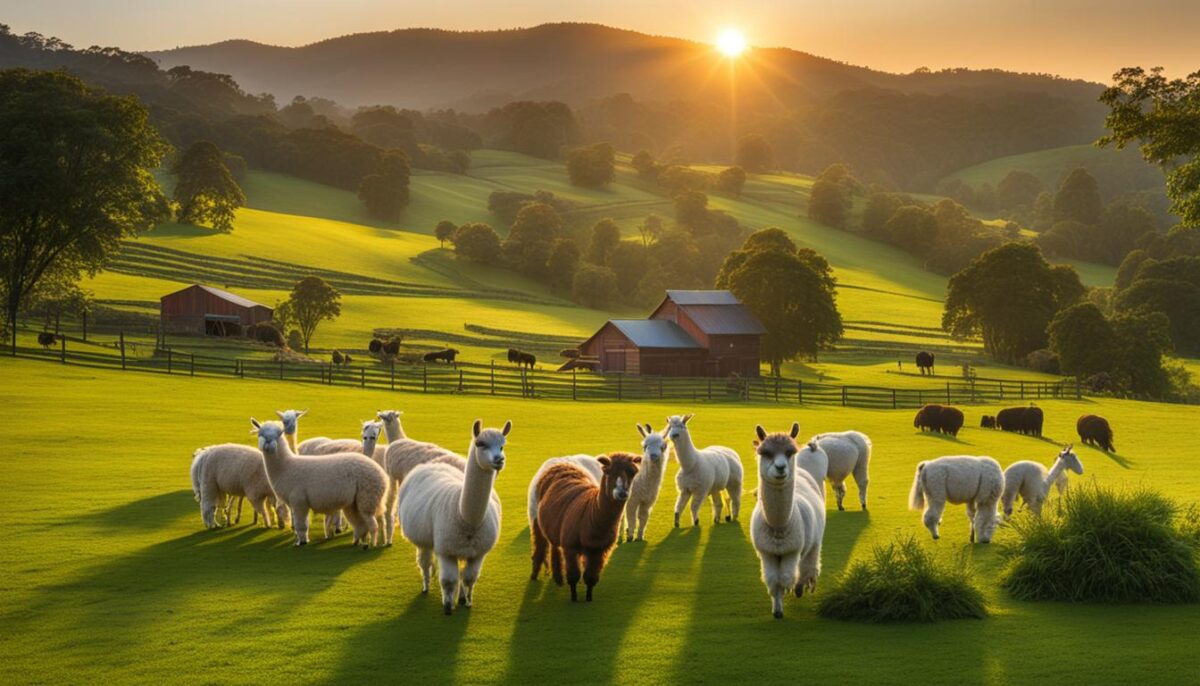
| Benefits of Keeping Alpacas and Goats Together |
|---|
| Alpacas provide protection against small predators, ensuring the safety of goats |
| Alpacas and goats share similar dietary preferences, simplifying feeding routines |
| Alpacas’ selective grazing habits complement goats’ voracious grazing, maintaining a healthy pasture |
Can Pygmy Goats Live with Alpacas?
Pygmy goats can happily coexist with alpacas on a farm. Like other goat breeds, pygmy goats have compatible needs and behaviors that allow them to live harmoniously with alpacas. Both alpacas and pygmy goats are social animals and enjoy being part of a herd, which makes them compatible companions.
When introducing pygmy goats to alpacas, it’s essential to ensure that they have enough space to roam and graze comfortably. Providing separate feeding areas for each species can help prevent competition and ensure that both animals receive their proper nutrition. Additionally, it’s crucial to monitor their interactions initially to ensure there are no aggressive behaviors or dominance issues.
Pygmy goats and alpacas have different grazing preferences, which can be beneficial for maintaining pastureland. While alpacas graze closer to the ground, pygmy goats prefer to graze higher vegetation, reducing competition for food resources. This difference in grazing behavior can contribute to a more balanced and sustainable pasture management system.
The Benefits of Keeping Pygmy Goats and Alpacas Together
- Space-saving: Combining pygmy goats and alpacas in the same habitat can save valuable space on the farm.
- Companionship: Alpacas and pygmy goats can form bonds and provide companionship to each other.
- Protection: Alpacas have a natural instinct to protect their herd, including pygmy goats, from small predators.
- Grazing management: The different grazing preferences between pygmy goats and alpacas can help maintain a diverse and healthy pastureland.
In conclusion, pygmy goats can live harmoniously with alpacas, provided that their needs are met and initial introductions are monitored. The compatibility between these two species can bring various benefits, including space-saving, companionship, protection, and improved pasture management. With proper care and management, keeping pygmy goats and alpacas together can be a rewarding experience for farmers and provide a thriving habitat for the animals.
Can Alpacas and Goats Breed?
In a nutshell, alpacas and goats cannot breed with each other as they are different species. Breeding can only occur within the same species, so the possibility of hybrid offspring between alpacas and goats is nonexistent.
This lack of breeding compatibility is due to the genetic differences between alpacas and goats. Alpacas belong to the camelid family, while goats belong to the bovine family. Their distinct genetic makeup prevents them from reproducing together.
While alpacas and goats cannot breed, they can still peacefully coexist on the same farm. It’s important to focus on providing appropriate care and meeting the individual needs of each species to ensure their well-being and compatibility.
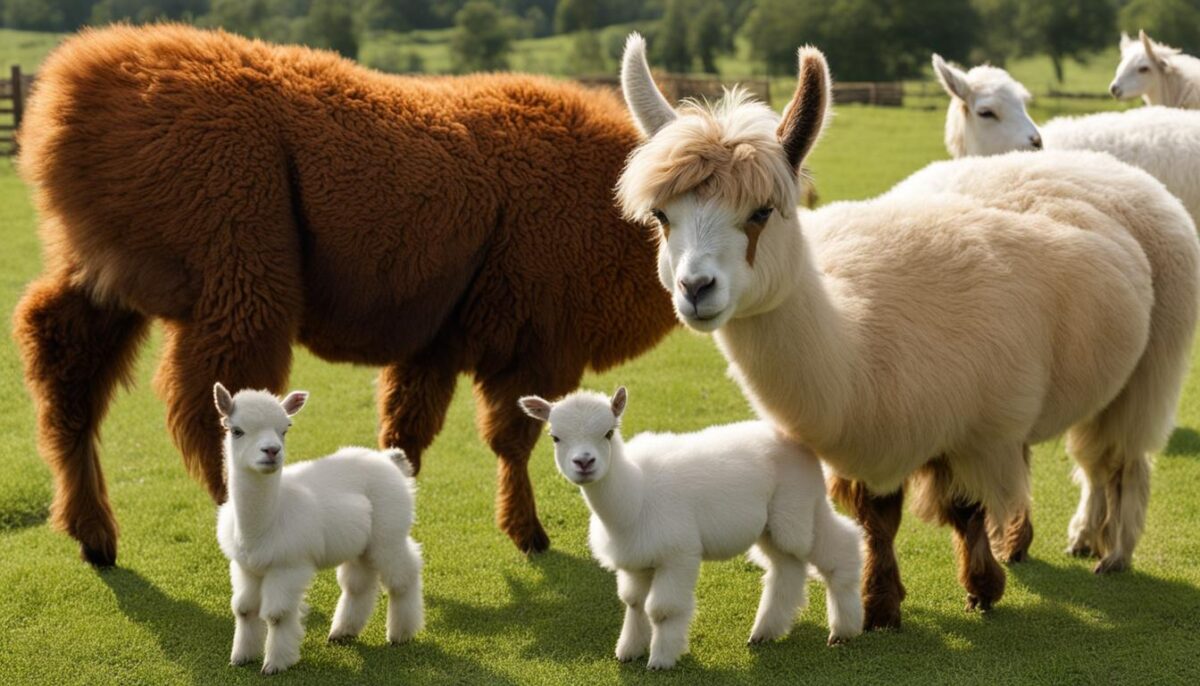
Table: Comparison of Alpacas and Goats
| Category | Alpacas | Goats |
|---|---|---|
| Average Lifespan | 15-20 years | 10-15 years |
| Diet | Herbivorous – mainly graze on grass and hay | Herbivorous – browse on various plants, including grass, leaves, and shrubs |
| Size | Medium-sized, around 3 to 4.5 feet tall at the withers | Varies depending on breed, generally larger than alpacas |
| Coat | Thick, woolly fleece | Hair or wool, depending on the breed |
| Behavior | Social animals that prefer to live in herds | Social animals that also thrive in groups |
Although breeding is not possible between alpacas and goats, their shared habitat can still offer benefits such as space-saving and predator protection. By understanding their differences and providing the necessary care, alpacas and goats can coexist harmoniously on a farm.
Are Goats and Alpacas Related?
Contrary to popular belief, goats and alpacas are not closely related. While both animals are domesticated and commonly found on farms, they belong to different families within the animal kingdom. Goats are part of the bovine family, which includes animals like cows and sheep. On the other hand, alpacas belong to the camelid family, which also includes camels and llamas. This genetic distinction means that goats and alpacas have distinct characteristics and behaviors that set them apart.
Despite their genetic differences, goats and alpacas can still coexist and even form bonds when kept together on a farm. Their distinct personalities and preferences contribute to the unique dynamic between these two species. While goats are known for their curiosity and independent nature, alpacas are more reserved and gentle. This contrast in temperament can add variety and interest to a mixed-species farm and create a harmonious environment for both animals.
When introducing goats and alpacas to each other, it’s important to consider their individual needs and provide suitable conditions for their well-being. This includes ensuring adequate food, shelter, and healthcare for both species. Additionally, proper management practices should be implemented to prevent any potential conflicts or injuries between the animals. With careful attention to their specific requirements, goats and alpacas can thrive together on a farm, despite their genetic differences.
Do Alpacas Protect Goats?
One of the significant benefits of keeping alpacas and goats together is that alpacas can serve as protectors for goats, especially against small predators. Despite their smaller size compared to llamas, alpacas have a natural instinct to guard their herd, and this instinct extends to goats when they cohabit. Alpacas possess a strong herd mentality and a keen sense of awareness, making them vigilant in detecting potential threats to their herd, including predators.
Alpacas may exhibit protective behavior by positioning themselves between the goats and potential dangers, such as foxes or coyotes. Their presence can deter predators and provide an added layer of security for the goats. This protective instinct is particularly valuable during vulnerable times, such as when goats give birth to their kids, as alpacas can be especially watchful and provide extra protection during this period.
It is important to note that not all alpacas may exhibit strong protective behavior towards goats, as individual temperament and previous experiences can influence their level of vigilance. However, when forming a bond with their herd, alpacas are likely to display defensive tendencies and contribute to creating a safer environment for goats.
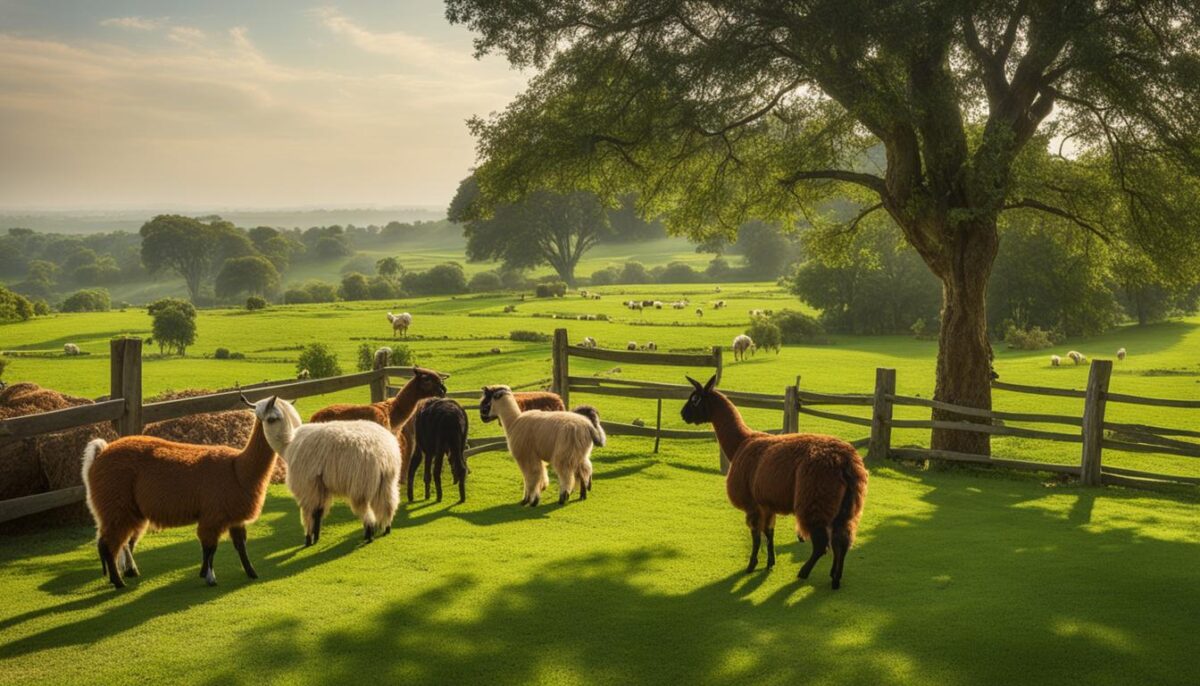
Conclusion
In conclusion, the compatibility of alpacas and goats makes it possible to raise them together on the same farm. With proper care and consideration of their individual needs, these two species can coexist harmoniously.
When raising alpacas and goats together, it is crucial to provide them with suitable conditions. This includes ensuring they have access to proper food, adequate housing, and regular health care. By meeting their specific requirements, you can create an environment where both animals can thrive.
While there may be some challenges to consider, such as the potential for bullying behavior and the risk of diseases spreading, the benefits of raising alpacas and goats together can be significant. Not only does it save space on the farm, but it also allows for a natural combination that helps maintain pasture land.
In summary, by prioritizing the compatibility of alpacas and goats and taking the necessary steps to ensure their well-being, you can successfully raise these animals together. With the right management and care, you can create a thriving environment where alpacas and goats can cohabitate and flourish.
FAQ
Can alpacas live with goats?
Yes, goats and alpacas can live together as long as their needs are met, including food, housing, and health care.
What do goats and alpacas need to live together?
They need proper food, suitable housing, enough pastured space to roam, and good health care practices.
What are the advantages of keeping goats and alpacas together?
It saves space on the farm, minimizes the use of fencing materials, and alpacas can provide protection to goats from small predators.
What challenges may arise when keeping goats and alpacas together?
Bullying behavior, a dirtier environment, and the risk of diseases being spread between the two species.
How should alpacas be introduced to goats?
Gradually and with caution, using a leash or animal halter to bring them near the goats while monitoring their interactions.
Are alpacas good companions for goats?
Yes, alpacas can form bonds with goats and provide protection against predators.
Can pygmy goats live with alpacas?
Yes, pygmy goats can live alongside alpacas just like other goat breeds.
Can alpacas and goats breed?
No, alpacas and goats are different species and cannot produce hybrid offspring.
Are goats and alpacas related?
No, goats belong to the bovine family, while alpacas belong to the camelid family. They are not closely related.
Do alpacas protect goats?
Yes, alpacas can serve as protectors for goats, especially against small predators.
How can goats and alpacas live together successfully?
By providing proper management, suitable conditions, and considering their individual needs for a harmonious cohabitation.
Source Links
- https://www.livingwithgotlands.com/2015/03/combining-sheep-and-alpacas-on-the-same-farm-terry-miller/
- https://goodsidekick.com/can-goats-and-alpacas-live-together/
- https://www.columbiamissourian.com/special_section/tourism/southwest_missouri/get-close-to-alpacas-sheep-and-goats-at-a-ranch-near-holden/article_d6ef2b3a-e888-11ed-baae-af7e7a59c508.html


